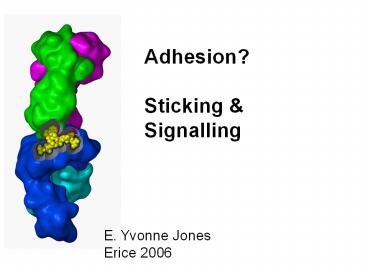Adhesion? PowerPoint PPT Presentation
1 / 21
Title: Adhesion?
1
Adhesion? Sticking Signalling
E. Yvonne Jones Erice 2006
2
T cell target cell interactions, a particular
form of cell-cell communication with specificity
contributed by pMHC TCR binding.
Result T cell receptor (TCR) signalling and
formation of an Immunological Synapse.
3
But, all pMHCs are not equal
Immunodominant HLA-A2 tumour epitope
NY-ESO-1157-165 SLLMWITQC
SLLMWITQV stimulates faster polarisation of lytic
granules to the immunological synapse
Chen Stewart-Jones et al (2005) J. Exp. Med.
201 1243-1255
4
and all TCRs are not equal
Structure of the immunodominant bV17-aV10s2 T
cell receptor with HLA A2/influenza matrix
epitope ..as used by gtone billion humans!
Stewart-Jones et al (2003) Nature Immunol. 4
657-663
5
Vß17 Flu Matrix T Cells- The Most Abundant T cell
Clonotype on the Planet
- An estimated 3 billion people have HLA-A2
- All have had Influenza
- Flu matrix responses dominate the immune
reaction to infection - Vß17 clonotype constitutes gt 80 of that response
- 0.5 kg of this receptor circulating in the world
- Stacking the receptors end-to-end would stretch
more than halfway to Neptune (2.6 billion km)
Guillaume Stewart-Jones, Jeffrey Ishizuka John
Bell, unpublished calculation
6
Why is a bV17-aV10s2 TCR so good at recognising
HLA A2/influenza matrix epitope?
7
Kuby, 4th edition
8
T cell receptors (TCRs) Gene segments Combinations
Va 50
Ja 50 2.5 x 103 alpha chains
Vß 20
Jß 13
Dß 2 520 beta chains
Any alpha with any beta chain Any alpha with any beta chain 1.3 x 106
- The potential TCR repertoire is further increased
- by the addition of N region nucleotides. The
recombination process is not precise. - the exact points of splicing between V, D and J
regions can vary over - several nucleotides
- extra nucleotides, called N regions, can also
be inserted at these joints. - The number of TCRs that we make is 2.5 x 107
9
The challenge
Flu matrix peptide presented by HLA-A2
provides few sidechains for TCR recognition
10
The answer
TCR positioned to insert CRD3b between
peptide and alpha 2 helix
11
(No Transcript)
12
Why is a bV17-aV10s2 TCR so good at recognising
HLA A2/influenza matrix epitope? Its because of
a distinctive CDR3b motif and combination of
residues unique to bV17-aV10s2 CDR1 and CDR2
loops that allow the CDR3b to be positioned
optimally to sample a unique feature of the
pMHC surface
Stewart-Jones et al (2003) Nature Immunol. 4,
657-663
13
sTCR mutants made and tested
Jeffrey Ishizuka Guillaume Stewart-Jones
14
Vß17 CDR2 Offers a Unique Sequence and Energetic
Landscape
15
So we are still on target with our hypothesis
for why a bV17-aV10s2 TCR is so good at
recognising HLA A2/influenza matrix
epitope. But why is this TCR-pMHC
immunodominant over all other TCR-pMHC
interactions involving influenza virus epitopes
presented by the MHC class I molecule HLA A2?
16
T cell target cell interactions, a particular
form of cell-cell communication with specificity
contributed by pMHC TCR binding.
Result T cell receptor (TCR) signalling and
formation of an Immunological Synapse.
17
Receptor protein tyrosine phosphatases
classification
18
RPTPm is a cell-adhesion molecule involved in
neural development (axon growth) and angiogenesis.
RPTPm
RPTPm expression on axonal growth cones (A and
B, Ledig et al., 1999) and at the endothelial
cell junctions (C and D, Bianchi et al., 1999).
19
Crystal structure of the MAM-Ig unit Aricescu
Hon (2006) EMBO J. 25 701-712
structure
function?
NO
for dimers need MIg-FNIII
and for adhesion need MIg-2xFNIII
so
20
MIg structure plus biophysical and functional
data generated several possible models for RPTPm
adhesive interactions
I recommend you go and see Radu Aricescus
poster in the Thursday afternoon session (also
Christian Siebolds poster on cell guidance
signalling)
Zipper model, consistent with the extended
planarity of the plasma membrane observed at
intercellular contact sites and with the multiple
interactions observed between RPTPm ectodomains
21
Christian Siebold
Weixian Lu
(Jeffrey Ishizuka) Guillaume Stewart-Jones
Radu Aricescu
In collaboration with John Bell, Vincenzo
Cerundolo, Andrew McMichael Anton van der Merwe

